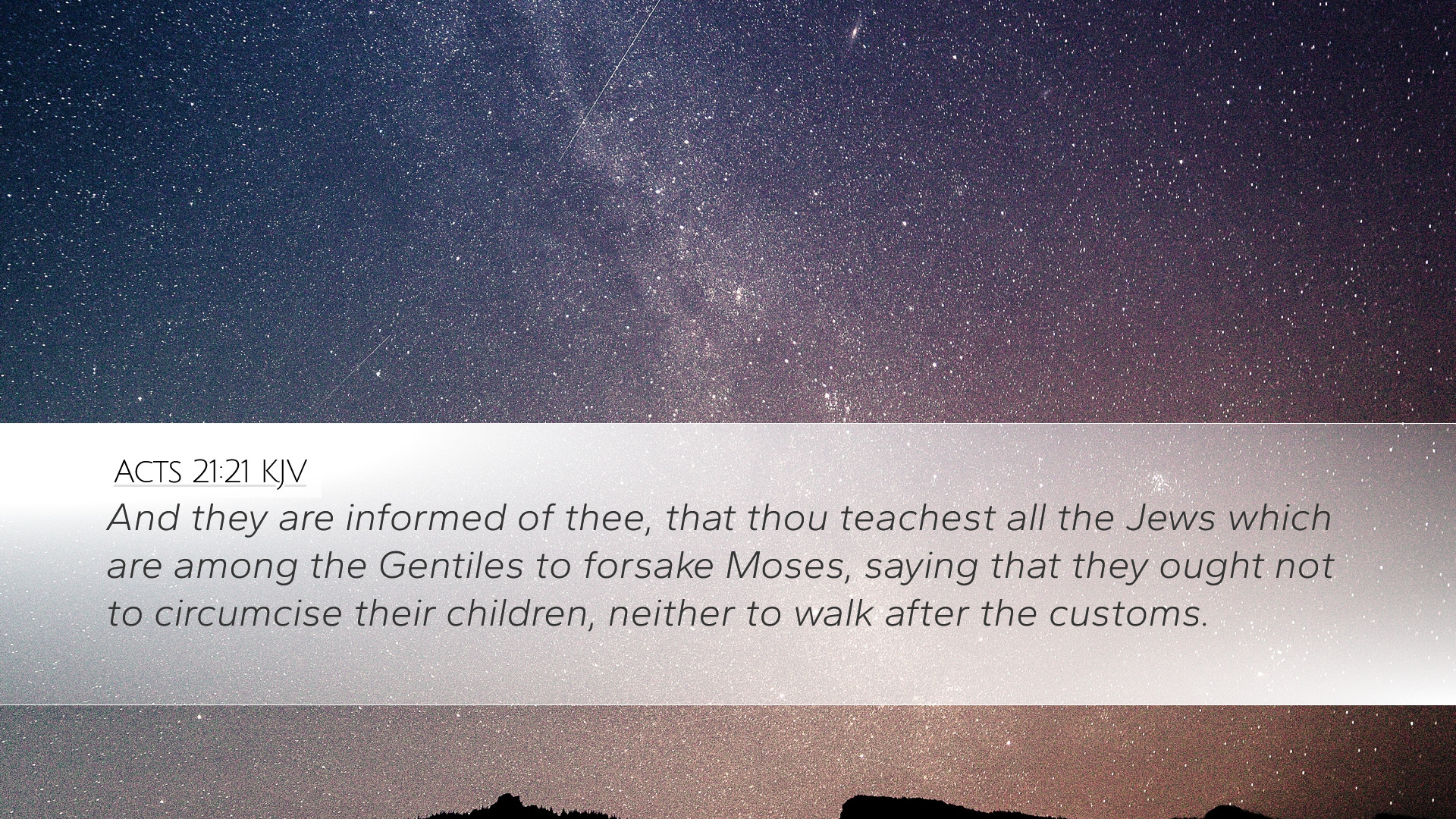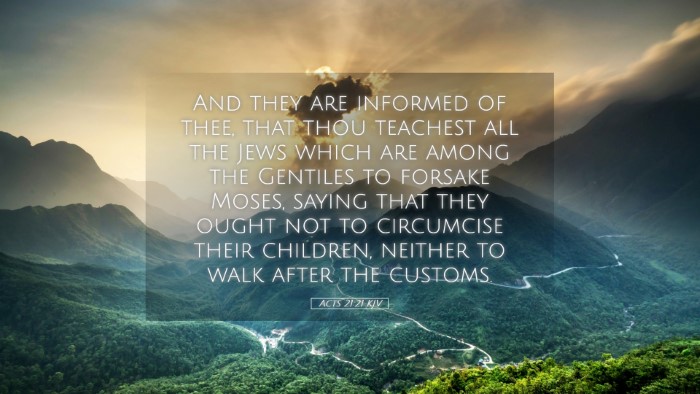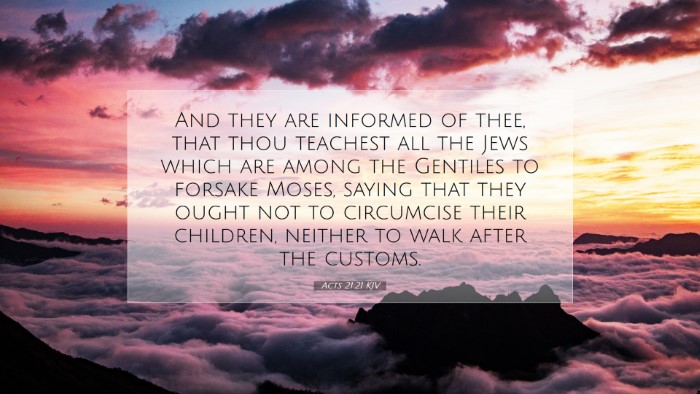Commentary on Acts 21:21
Acts 21:21 states: "And they are informed of thee, that thou teachest all the Jews which are among the Gentiles to forsake Moses, saying that they ought not to circumcise their children, neither to walk after the customs." This verse represents a critical moment in the context of early Christian witness and the interactions between Jewish customs and the emerging Christian faith. Below is a deeper examination of this verse through various public domain commentaries.
Contextual Overview
The Book of Acts chronicles the spread of the Gospel and the establishment of the Church following the ascension of Christ. Acts 21 marks Paul’s journey to Jerusalem, which is marked by tensions concerning his ministry to Gentiles and his respect for Jewish customs. The conflict surrounding Paul’s teachings represents broader themes of law vs. grace, the nature of salvation, and the inclusivity of the Gospel.
Insights from Matthew Henry
Matthew Henry, in his commentary, highlights the concern of the Jerusalem church regarding Paul’s teaching among the Gentiles. He explains that:
- Misunderstanding of Paul's Message: The reports reaching the Jerusalem believers suggest that they misunderstood Paul’s mission. While he did emphasize salvation by grace through faith apart from the Law, he never outright condemned the practices of the Jewish faith for those who wished to follow them.
- Importance of Tradition: Henry notes that the Jews had maintained a strong adherence to their traditions and customs, viewing them as integral to their identity. The accusation posed against Paul reflects this tension; he respected customs but preached the Gospel beyond Jewish boundaries.
- Unity in Diversity: The early church was grappling with how to unify believers from various backgrounds. Paul's ministry raised questions about the necessity of the Jewish Law for Gentile believers, relevant for all subsequent discussions on the law and grace.
Perspectives from Albert Barnes
Albert Barnes provides a more detailed analysis of the implications behind the accusations made against Paul:
- Accusations of Apostasy: Barnes emphasizes that the charge of teaching Jews to forsake Moses was seen as a severe betrayal of Jewish heritage. He underscores that this reflects a broader conflict between the evolving church and established religious practices.
- The Role of Circumcision: He points out Paul’s stance on circumcision, affirming that it was not necessary for salvation. However, he often practiced the Law to win over Jews for the Gospel’s sake (1 Corinthians 9:20).
- Pastoral Responsibility: Barnes encourages leaders to recognize that misunderstandings can arise from differing interpretations of doctrine. It is vital for church leaders to engage in meaningful dialogue to clarify positions and foster unity.
Thoughts from Adam Clarke
Adam Clarke’s commentary adds depth by focusing on the implications of the accusations within the larger narrative of Acts:
- Religious Tensions: Clarke notes that this confrontation was a manifestation of the larger religious conflict of the time. This moment was pivotal in understanding the transitional phase of the early church as it moved from a Jewish-centric belief to one that embraced Gentiles.
- Focus on Jesus Christ: Clarke indicates that Paul’s message was rooted in the fulfillment of the Law through Christ. The conflict over circumcision and other Jewish customs led to a significant Christological discussion about what it means to be part of God’s family.
- Encouragement to Believers: Clarke encourages readers to see Paul’s unwavering commitment to sharing the Gospel despite opposition. His experiences demonstrate the importance of faithfulness and conviction in the face of adversity.
Theological Implications
This verse serves as a watershed moment for both theology and practice. Here are several vital theological implications drawn from the insights of the commentaries:
- Law and Grace: The ongoing debate concerning the necessity of the Mosaic Law illustrates the transformative nature of the Gospel. Early Christians began to wrestle with how faith in Christ reconciles with Jewish law, a relevant discussion for contemporary theologians.
- Cultural and Religious Diversity: Paul's message champions inclusivity which is vital for church leaders as they navigate expressions of faith across diverse cultures and practices.
- Faithfulness to the Gospel: The courage demonstrated by Paul to preach the fullness of the Gospel amidst opposition calls for a renewal of boldness among current church leaders and members. It urges believers to remain rooted in doctrine while engaging with diverse communities.
Conclusion
Acts 21:21 captures a crucial moment of tension and misunderstanding that resonates throughout the ages. By examining the insights of Henry, Barnes, and Clarke, we can better appreciate the struggles faced by early Christians and the foundational issues regarding the relationship between law and grace. This verse implores modern readers, particularly pastors and theologians, to continue examining their own theological positions with fidelity and also to embrace the richness that comes with diverse expressions of faith within the body of Christ.


